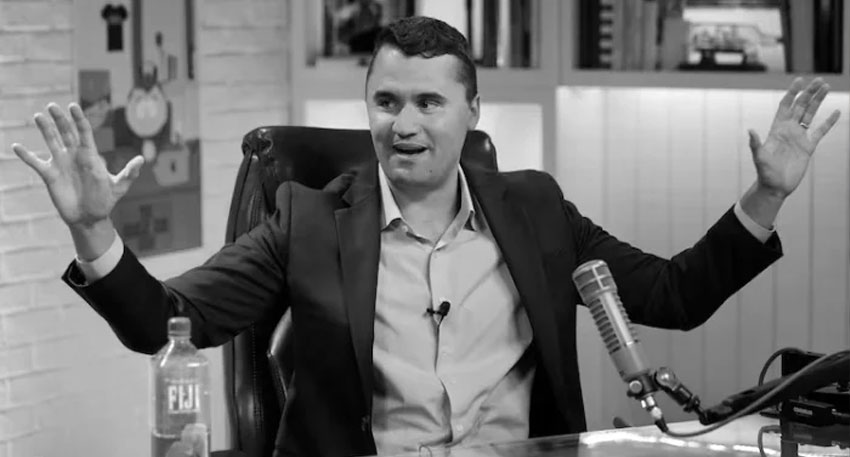
Charlie Kirk’s assassination and the future of American conservatism
OREM, Utah — What began as a routine campus event turned into a national tragedy. On a sunny Wednesday afternoon, Charlie Kirk, the 31-year-old founder of Turning Point USA, was delivering one of his trademark debates at Utah Valley University. Known for his confrontational style and willingness to spar with critics, he was answering a question on America’s gun violence crisis when the unthinkable happened.
A sharp rifle crack rang out. A bullet struck him in the neck. Kirk collapsed at the podium, blood pouring from the wound. Students screamed, some diving for cover, others sprinting for the exits, unsure if more shots would follow. Within minutes, security ushered the terrified crowd out while paramedics rushed the conservative activist to the hospital. By nightfall, doctors confirmed what his supporters dreaded: Charlie Kirk was dead.
The rise of a conservative star
Kirk’s journey from small-town Illinois to the heart of American politics was meteoric. At just 18, he founded Turning Point USA (TPUSA) in 2012, with a mission to “challenge leftist orthodoxy on campus.” What began as a shoestring operation soon attracted major conservative donors and grew into one of the most influential youth organisations in the country.
By 2024, TPUSA boasted over 850 chapters nationwide and commanded a budget in the tens of millions. Its slick conferences, social media dominance, and constant presence on college campuses made it a pipeline for training the next generation of Republican activists. Kirk’s work was widely credited with boosting youth turnout for Donald Trump’s 2024 presidential comeback, securing him a place as one of the president’s closest allies.
“He delivered us the youth vote,” Trump once said of Kirk, a testament to his strategic influence. Some party insiders openly speculated that Kirk himself might one day run for office, perhaps even the presidency.
National mourning and fury
News of the assassination reverberated across the United States with stunning speed. President Trump addressed the nation in a solemn Oval Office broadcast, calling Kirk “a warrior for America’s youth” and announcing that the activist would be posthumously awarded the Presidential Medal of Freedom. Flags at federal buildings were lowered to half-mast.
Conservative leaders and commentators flooded social media with tributes and outrage. Figures such as Steve Bannon, Megyn Kelly, and Republican members of Congress described Kirk as a martyr. Many immediately blamed “radical leftists” for his killing, despite authorities cautioning against speculation. Within hours, hashtags demanding “justice for Kirk” trended across platforms, while conspiracy theories proliferated about the true nature of the shooting.
The shooter and the mystery
Police confirmed that 22-year-old Tyler James Robinson has been taken into custody for the assassination of Charlie Kirk after a two-day manhunt. Investigators linked him to the crime through DNA and palm prints recovered from a rooftop near the shooting site, along with a bolt-action rifle abandoned in nearby woods.
Forensic teams also recovered several bullet casings inscribed with bizarre and provocative messages, including “Hey fascist! Catch!”, “Bella Ciao” — a nod to the famous anti-fascist anthem — as well as mocking phrases like “If you read this, you are gay, LMAO” and “OwO what’s this?”. Authorities say the mix of taunts and ideological references complicates efforts to determine Robinson’s precise motive but highlights the blend of internet meme culture and political anger behind the killing.
Officials are probing his background, motives, and possible affiliations, but so far, little is publicly known. But right after the incident happened, “radical leftists” were blamed for the situation; hence, there’s no proof of it yet.
Some accounts describe the shooting as chillingly precise, suggesting advance planning rather than a spur-of-the-moment attack. Others warn against assuming political motives before facts are established. Still, the murder of a figure as polarizing as Kirk was bound to fuel speculation.
In a recent statement, governor of Utah, Spencer Cox, says he prayed for 33 hours that the killer of Charlie Kirk was not “one of us.” and that it was someone from “another country.” The statement sparked backlash on social media about how the governor looked so disappointed that he had no person of color, migrant, or Muslim to blame.
A polarising figure
To supporters, Kirk embodied courage: a young man who stormed hostile campuses, defended conservative values, and stood unafraid against what he often called “the tyranny of the woke left.” His video clips, where he debated students on issues like guns, abortion, and race, went viral across right-wing media and are blatantly criticized around the world.
To critics, he was a provocateur who thrived on stoking division. His rhetoric on immigration, gender identity, and Christianity aligned him with America’s far-right currents, particularly the growing Christian nationalist movement.
Kirk also stirred unease within his own ranks when he began voicing subtle doubts about America’s unwavering support for Israel. Though still broadly pro-Israel, he questioned whether Washington should remain uncritical of all its actions. These remarks unsettled some of his biggest donors and provided fodder for conspiracy theories after his death.
America at edge
The killing of Charlie Kirk is not just the story of one man but a reflection of a broader American crisis. Political violence, once an aberration, has become frighteningly common. Mass shootings, assassination attempts, and extremist plots now punctuate the nation’s public life.
Analysts warn that the escalating polarisation of U.S. society has created an atmosphere where violence feels inevitable. Commentators across the spectrum have begun to wonder aloud whether the country is edging toward a form of civil conflict—an outcome once unthinkable but no longer impossible.
Erika Kirk’s defiance
In the aftermath, Kirk’s widow, Erika, struck a defiant tone. In an emotional statement, she pledged that her husband’s mission would not die with him. Turning Point USA’s “American Comeback Tour” and its flagship conference, AmericaFest, would go ahead as planned.
“Charlie’s voice will echo in every young person who chooses courage over silence,” she declared. Her words underscored the determination of the movement to transform tragedy into renewed momentum but all extremism is suppose to end this way.
Legacy more like a warning
Charlie Kirk’s death leaves a vacuum in the conservative landscape. He was right’s favourite boy with all extremist capabilities rolled into on. once admired as a visionary and derided as a demagogue. Whether seen as martyr or menace, his influence was undeniable.
Also Read: Manhunt intensifies after Charlie Kirk shooting
Kirk embodied a transformation in U.S. conservatism—youth-driven, media-savvy, and inseparably tied to culture wars. His violent end is not merely a personal tragedy; it is a warning about the fragility of a nation at war with itself. However, it should be kept in mind he died of his own; the same gun culture he defended took his life.




